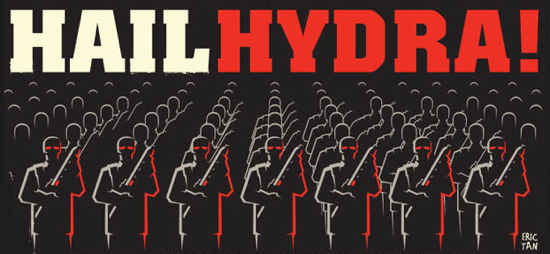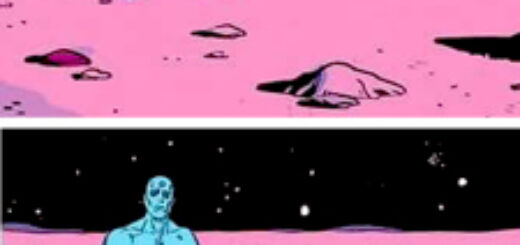Ed Catto: Sam Wilson’s Timely Tales
We’ve been obsessing over the wrong Captain America stuff.
Last month, both Geek Culture and the “world at large” (they aren’t as different anymore, are they?) were outraged that Captain America, in the debut issue of his latest series, was revealed to be an evil Hydra operative. Marvel, to their credit, played it all with a straight face. Some devotees seemed eager, unlike The Who, to “get fooled again.” Fists were clenched and keyboards were angrily pounded as indignant fans expressed their extreme displeasure at the “bad guy treatment” given to a favorite fictional hero.
 The Hail Hydra shocker inspired a kazillion hilarious parodies, too.
The Hail Hydra shocker inspired a kazillion hilarious parodies, too.
But in the second issue of this new series, Marvel revealed it was all an insidious brainwashing trick. “Oh, never mind,” sighed most outraged fans. However, some outraged fans broke into a victory dance, assuming that Marvel caved to their wishes and changed the story based on their expressed outrage. These fans don’t quite realize how far in advance comics, a very collaborative effort, must be planned before the publication date.
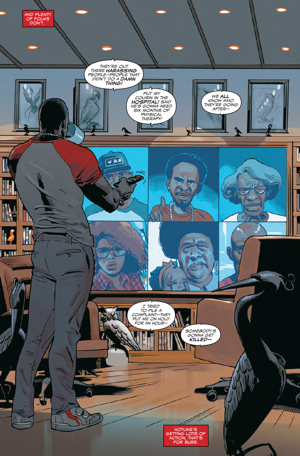 There was also a hubbub about the new Captain America statue being erected in Brooklyn. Was it the “real” Captain America or just the cinematic version? Mike Gold explored this notion here when he talked about conflating the media version of a character with the original comic incarnation.
There was also a hubbub about the new Captain America statue being erected in Brooklyn. Was it the “real” Captain America or just the cinematic version? Mike Gold explored this notion here when he talked about conflating the media version of a character with the original comic incarnation.
Others, like Teresa Jusino in this Mary Sue column, pointed out that in the original comics continuity, Steve Rogers, the everyman who would become the most popular Captain America, was born not in Brooklyn but in the lower East side.
Even with all that going on, the Captain America news we should be buzzing about is the story unfolding in Sam Wilson: Captain America #11. In this series, Captain America’s pal and partner, Sam Wilson, has graduated from his Falcon identity to become another Captain America. Hey it makes sense to me. Companies can have several Vice Presidents, why can’t our nation have more than one Captain America?
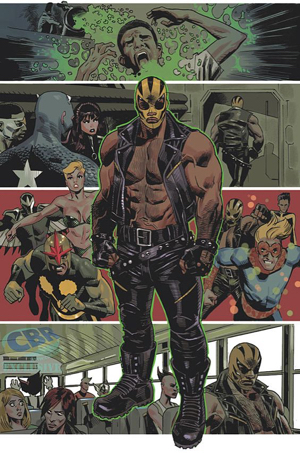 It’s a gorgeous looking comic with fantastic artwork by Daniel Acuna. This brilliant Spanish artist combines dynamic images with innovative composition and then he then wraps it all in a spectacular mastery of color.
It’s a gorgeous looking comic with fantastic artwork by Daniel Acuna. This brilliant Spanish artist combines dynamic images with innovative composition and then he then wraps it all in a spectacular mastery of color.
I was astonished when I read this comic right after July 4th. To put it in perspective, this was the week our nation had been shocked and saddened by violence in Baton Rouge, Dallas and Minnesota.
Remember I mentioned comics must be planned and created months ahead of time in order to make the publication deadline? It seemed like Nick Spencer, the writer of Sam Wilson: Captain America #11, penned the story that very week. It had a “ripped from the headlines” feel, complete with a nuanced and balanced presentation.
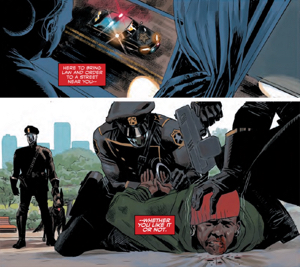 In this story, the Americops, a sort of privately funded police force, are the villains. The creators didn’t waste the opportunity to show the difficult conflicts faced by several characters as they struggled, just like the rest of us, to make sense of the awful situation in this story unfolding in the comic as well as in the real world.
In this story, the Americops, a sort of privately funded police force, are the villains. The creators didn’t waste the opportunity to show the difficult conflicts faced by several characters as they struggled, just like the rest of us, to make sense of the awful situation in this story unfolding in the comic as well as in the real world.
Kudos to all involved for adding texture, depth and hopefully a little more understanding to the national conversation.



